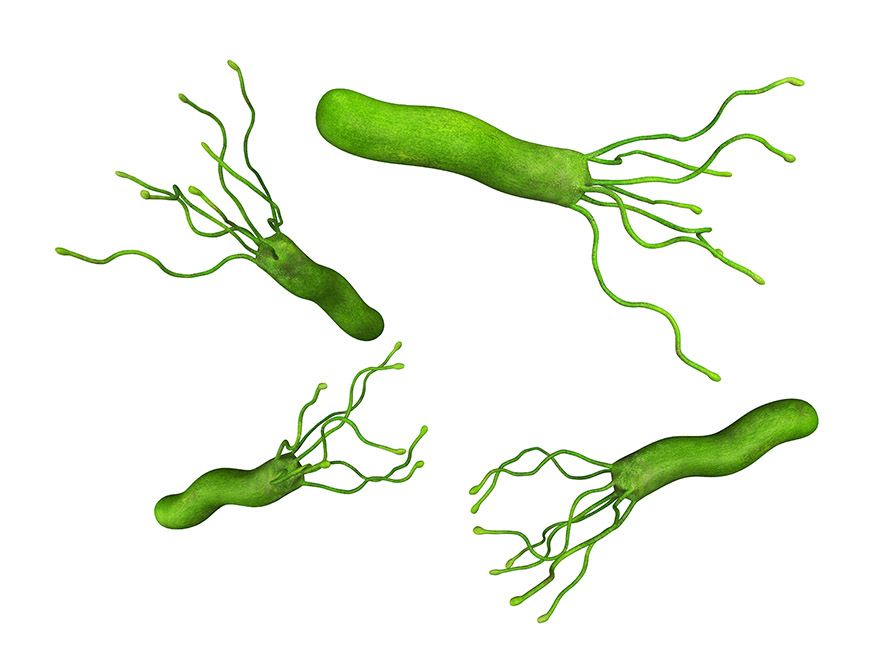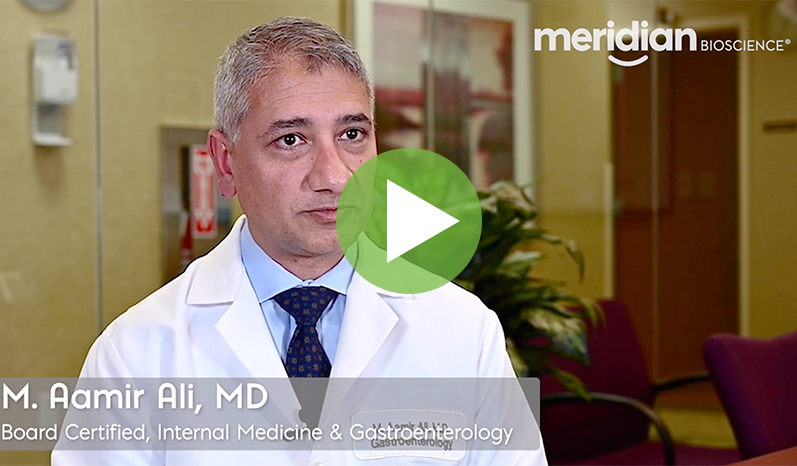Do you see patients presenting with symptoms such as
- Heartburn
- Dyspepsia
- Stomach Pain
- Bloating
- Indigestion
These symptoms can be caused by several gastrointestinal (GI) conditions such as peptic ulcer disease (PUD), gastritis, GERD, or even gastric cancer. It could also be something more common, like H. pylori; which affects 1 in 3 people.1
Differentiating between GI conditions that share similar symptoms can be frustrating for both physicians and patients.
Listen to Dr. Ali’s advice
![]()
H. pylori
Helicobacter pylori (H. pylori) bacterium is found in the lining of the stomach. An infection with H. pylori is linked to several important upper gastrointestinal (GI) conditions, including chronic gastritis, peptic ulcer disease, and gastric cancer.5

The consequences can be serious
1 in 3 Americans are infected with H. pylori.1
9 in 10 ulcers are caused by untreated H. pylori infections.2
Gastric Cancer risk is 6 times higher in H. pylori-infected individuals.3
Dyspepsia
Dyspepsia is used to describe what many people refer to as stomach pain or abdominal pain centered in the upper abdomen. A common cause of dyspepsia is an infection with H. pylori.5

Patients with dyspepsia and no alarm symptoms should undergo initial testing and treatment for H. pylori.4
Symptoms ofH. pylori
- Stomach or abdominal discomfort
- Stomach or abdominal pain
- Bloating
- Vomiting
- Regurgitation
- Heartburn/reflux
- Nausea
- Flatulence
- Belching
- Indigestion
Dyspepsia AlarmSymptoms
- Age older than 60 years with new-onset dyspepsia
- Family history of upper gastrointestinal cancer
- Unintended weight loss
- Gastrointestinal bleeding
- Progressive dysphagia
- Odynophagia
- Unexplained iron-deficiency anemia
- Persistent vomiting
- Palpable mass or lymphadenopathy
- Jaundice
Learn more about H. pylori
H. pylori Education
H. pylori Facts
Treat the infection, not the symptoms
- Proton pump inhibitors (PPIs) are commonly used to alleviate symptoms and discomfort in patients but may mask and prolong an H. pylori infection.
- Performing an H. pylori test before writing a PPI prescription can help identify H. pylori-positive individuals, allow treatment, and prevent chronic PPI use.
- Prolonged PPI (prescription and/or OTC) use is associated with increased risk of fractures and kidney disease.6
- The American Gastroenterology Association (AGA) and the American College of Gastroenterology (ACG) recommend a test, treat, and retest approach to confirm eradication with an active infection test prior to prescribing a proton pump inhibitor.4,7
Test for H. pylori before prescribing a PPI
Approximately 60% of adult patients are already taking a PPI when they initially present with GI symptoms.8
One out of every 4 patients on PPI therapy is H. pylori-positive and can potentially be removed from PPI.7
Annual expenditure on PPIs in the US is $11 Billion.9
Prescribing PPIs? Get the facts.
Clinical guidelines: Test. Treat. Test again.
Test
Guidelines by both ACG and AGA recommend to test, treat, and retest to confirm eradication with a non-invasive active infection test for patients under the age of 60, with no alarm symptoms.4,7 Stool antigen and urea breath tests are recommended.
Patients over the age of 60, or under 60 with alarm symptoms, should be tested with an endoscopy.4,7
AGA and ACG state serology (antibody) testing, which does not test for an active H. pylori infection, should no longer be used.4,7
“A positive serology test is no better than a coin toss in predicting the presence of active infection.”5
Fast Facts
Serology cannot distinguish active H. pylori from past infection.10
Serology antibody testing is not recommended and is not reimbursed by most insurance companies.4,7,11
The sensitivity and specificity of serology for the detection of H. pylori infection are too poor to be recommended as the initial screening test.10
H. pylori testing Guidelines and Recommendations
Treat
If H. pylori is detected, initiate treatment. Although several treatment regimens for H. pylori infections have been identified, none has yet emerged as superior. Variables such as cost, tolerability, ease of administration, and patient adherence should be considered when prescribing therapy.12
Get info on treating H. pylori
Rational Helicobacter pylori therapy
Update on triple therapy for eradication of Helicobacter pylori
Test Again
Confirmatory testing is a good standard of care.
Repeat testing after H. pylori eradication therapy—the “test-treat-retest” strategy—should be offered to all patients to confirm that the infection has been cured.13
Fast Facts
H. pylori eradication therapy fails in 1 out of 4 patients.12
Antibiotic resistance, poor compliance—or both—are considered the most common causes of H. pylori treatment failure.5
Antibiotic resistance may be the strongest predictor of treatment failure.14
Rule out H. pylori first
Testing for H. pylori first has many advantages such as:
- Decreased complications associated with untreated, long-term H. pylori infections.
- Reduced risks associated with chronic PPI use among patients.15
- Promoting antibiotic stewardship by appropriately treating patients.
If you suspect an H. pylori infection, here are some tools to educate patients about H. pylori
Resources
Educational Materials

Articles/Journals

- AGA Clinical Practice Update on De-Prescribing of Proton Pump Inhibitors
- ACG Guidelines
- AGA Guidelines
- Houston Consensus Conference on Testing for Helicobacter pylori Infection in the United States
- Rational Helicobacter pylori Therapy: Evidence-Based Medicine Rather Than Medicine-Based Evidence.
- Update on triple therapy for eradication of Helicobacter pylori: current status of the art
References

1. Fennerty, M. B. Helicobacter pylori: why it still matters in 2005. Cleveland Clinic Journal of Medicine, 2005; 72(Suppl_2), S1-7. https://doi.org/10.3949/ccjm.72.suppl_2.s1.
2. Centers for Disease Control. MMWR (October 1997) Knowledge About Causes of Peptic Ulcer Disease—United States, March-April 1997. https://www.cdc.gov/mmwr/preview/mmwrhtml/00049679.htm. Accessed June 9, 2022.
3. Helicobacter and Cancer Collaborative Group. Gastric cancer and Helicobacter pylori: a combined analysis of 12 case control studies nested within prospective cohorts. Gut. 2001 Sep;49(3):347-53. doi: 10.1136/gut.49.3.347. PMID: 11511555; PMCID: PMC1728434.
4. Chey, W. D., Leontiadis, G. I., Howden, C. W., & Moss, S. F. American College of Gastroenterology Clinical Guideline: Treatment of Helicobacter pylori Infection. American Journal of Gastroenterology, 2018; 113(7), p1102. doi: 10.1038/s41395-018-0132-6
5. Chey WD & Wong BCY. Practice Parameters Committee of the American College of Gastroenterology. American College of Gastroenterology guideline on the management of Helicobacter pylori infection. Am J Gastroenterol, 2007; 102(8):1808-1825.
6. Lazarus B, Chen Y, Wilson FP, Sang Y, Chang AR, Coresh J, Grams ME. Proton Pump Inhibitor Use and the Risk of Chronic Kidney Disease. JAMA Intern Med, 2016;176(2):238–246. doi:10.1001/jamainternmed.2015.7193
7. Talley, N. J. American Gastroenterological Association Medical Position Statement: Evaluation of Dyspepsia. Gastroenterology, 2005; 129(5):1753–1755. https://doi.org/10.1053/j.gastro.2005.09.019
8. Data on file. Otsuka America Pharmaceutical, Inc.
9. Heidelbaugh JJ, et al. Overutilization of proton-pump inhibitors: what the clinician needs to know. Therap Adv Gastroenterol, 2012 Jul; 5(4): 219-232.
10. Vakil, N., & Fendrick, A. M. (2005). How to test for Helicobacter pylori in 2005. Cleveland Clinic Journal of Medicine, 72(Suppl_2), S8. https://doi.org/10.3949/ccjm.72.suppl_2.s8.
11. Hashem B. El-Serag, John Y. Kao, Fasiha Kanwal, Mark Gilger, Frank LoVecchio, Steven F. Moss, Sheila Crowe, Adam Elfant, Thomas Haas, Ronald J. Hapke, and David Y. Graham. Houston Consensus Conference on Testing for Helicobacter pylori Infection in the United States. Clinical Gastroenterology and Hepatology, 2018; 16:992–1002.
12. Urgesi R, Ciaci R, Ricconi ME. Update on triple therapy for eradication of Helicobacter pylori: current status of the art. Clin Exp Gastroenterol, 2012;5:151-157.
13. American Family Physician, Practice Guidelines: H.pylori Infection: ACG Updates Treatment Recommendations, January 2018; 97(2):137.
14. Vakil, N., & Megraud, F. (2007). Eradication Therapy for Helicobacter pylori. Gastroenterology, 133(3), 985–1001. https://doi.org/10.1053/j.gastro.2007.07.008
15. Acid-reducing medicines may lead to dependency; EurekAlert! The Global Source for Science News, AGA 2009. Available at: https://www.eurekalert.org/pub_releases/2009-07/aga-amm062909.php
Stay in the LoopReceive information regarding H. pylori, policy updates, educational tools, and more!
Receive information regarding H. pylori, policy updates, educational tools, and more!
